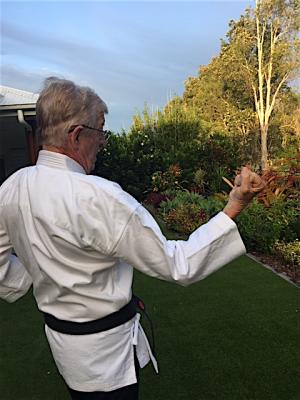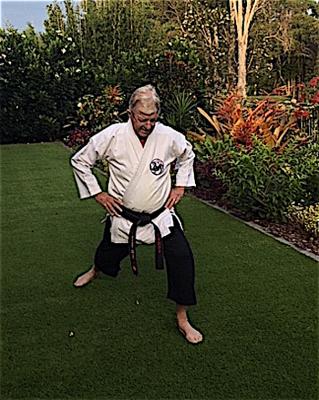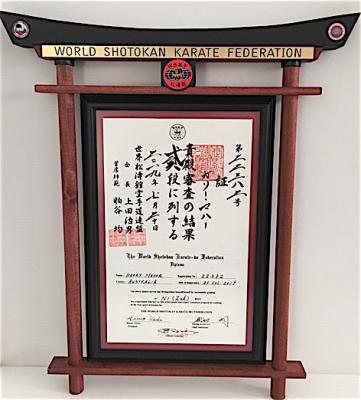“Happy as Garry” was the immediate response by local karateka, 77-year-old Garry Maher on receiving his 2nd Dan Black Belt Karate Diploma from World Shotokan Karate Federation (WSKF) Australian representative 6th Dan Sensei Bryan Dukes.
Garry, who capped off last year with a gold medal in the Sunshine Coast Karate Challenge, was later invited and successful in his WSKF Black Belt Diploma grading and presented with an additional token of recognition – a WSKF Black Belt on which his name was embroidered in Japanese, before receiving his diploma at a ceremony at Sunshine Coast Martial Arts, Noosaville.
“Every reason to be happy,” Garry said.
“What I found particularly gratifying with this award was the fact that 14 years ago at the age of 64 I took on the challenge of a martial art from a completely different country, a completely different culture and a completely different language. And with a lot of help and support from my wife, Bernadette, chief instructor Bryan Dukas and his instructional staff at Sunshine Coast Martial Arts Noosaville, coupled with patience and dedication on their part and hard work on my part, numerous bruises, a broken nose, a couple of broken bones, a lot of sweat, a little blood and even the odd tear or two, I managed to ‘hang in there’ to the point where that country – Japan and the powers that be in Tokyo recognised my efforts by awarding me this diploma. Somewhat surreal for me.”
Garry who already had several university and other tertiary qualifications including a federal government martial arts teaching qualification ‘under his belt’ found the striving towards this award the most challenging – physically, mentally and spiritually.
“The essence of karate as defined in its Code of Conduct – the ‘Dojo Kun’ becomes a way of life – a way of thinking – continually looking at ways of reducing or eliminating negative attitudes, faults and failings, and looking at ways to improve personal development and growth, all of which overflow into normal everyday thinking and daily life, even when dealing with the now daily changes to government and business policies regarding the managing of COVID19. For me, it’s all about continual improvement physically, mentally and spiritually – not necessarily in a religious sense but a ‘fire in the belly’ attitude to life – that the glass is always half full – not half empty; whether I have a good day or bad day is entirely up to me, it’s a decision I make, and like every other universal catastrophic event, like this pandemic I know it will pass. The one thing I’ve learned throughout this whole karate journey and of which I’m now acutely aware more than ever, is that for me, I still have a long way to go.”
“While the ravages of time and the normal ageing process are starting to become more noticeable, wishing at times I had a grease nipple on some of my joints in which to squirt a shot of WD40 occasionally, I shudder when I think of what I’d be like today had I not taken up karate when I did, training virtually every day since, either my myself at home or at the karate school.
“For me, it’s been a lifesaver in so many respects and has helped me considerably during these turbulent, anxious and certainly unhappy times for numerous people. While I might’ve left my run a bit late for inclusion in the Australian Karate Team for the Tokyo Olympics now planned for 2021 there is absolutely nothing stopping me from still training for it and being ready with my can of WD40 just in case of a late call up – you never know,” he adds with a smile.
Garry is convinced that karate has something to offer everybody, irrespective of age or ability but he strongly suggests that anyone interested in taking it up to first seek an opinion or advice from their doctor or health adviser like he did with his GP who granted him permission with the caveat, “Act your age – you’re 77 not 17” thus giving him the green light to continue his training cautiously.
“I’ve worked in many training establishments during my life – police academies, universities, military bases, TAFE colleges, hospitals and private training organisations, and I found SCMA karate instructors and the diversity of programs available, are up there with the best in the preparation, personal attention, dedication (and for me, ‘patience’) and overall professional commitment to its students,” he said.
“I can see why SCMA has been recognised over the past four years by the Queensland Karate Association, as the best karate training school in Queensland evidenced by the number of its local, national and international karate champions. SCMA has helped me realise something I thought impossible – ‘A Black Belt Diploma in the Japanese Martial Art of Shotokan Karate’ signed and issued by Master Hitoshi Kasuya, Chief Instructor, World Shotokan Karate Federation, Tokyo. Why would I not be Happy as Garry?”





![[READER COMPETITION] – Win a family ticket to see The Riddle of Washpool Gully at the J](https://noosatoday.com.au/wp-content/uploads/2026/02/washpool-gully-1-324x235.png)





